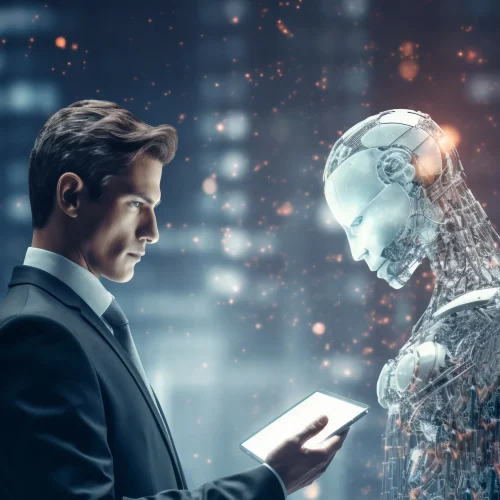Introduction
The integration of artificial intelligence in human resources is reshaping how organizations attract, manage, and retain talent. From automating repetitive tasks to predicting employee turnover, AI is empowering HR teams to make data-driven decisions while enhancing efficiency. As businesses compete for top talent in a dynamic global market, leveraging AI for human resources has transitioned from a luxury to a necessity. This article explores the transformative impact of Artificial Intelligence in Human Resources, its applications, ethical considerations, and what the future holds for this rapidly evolving field.
The Evolution of HR: From Manual Processes to AI-Driven Solutions
Human resources has historically been a people-centric domain, relying on intuition and manual processes. However, the rise of artificial intelligence in human resource management is introducing unprecedented precision and scalability. Traditional HR tasks—such as resume screening, payroll management, and performance reviews—are now being streamlined through AI in human resource management tools.
By analyzing vast datasets, Artificial Intelligence in Human Resources identifies patterns that humans might overlook. For example, machine learning algorithms can predict candidate success, detect attrition risks, and recommend personalized training programs. This shift not only saves time but also reduces biases, fostering a more inclusive workplace.
AI in Recruitment and Talent Acquisition
Recruitment is one of the most time-consuming HR functions. Artificial Intelligence in Human Resources synergize here to revolutionize talent acquisition:
Resume Screening and Candidate Matching
AI-powered tools like Applicant Tracking Systems (ATS) scan resumes for keywords, skills, and experience, ranking candidates based on job requirements. Platforms such as HireVue use AI in HR to analyze video interviews, assessing verbal and non-verbal cues to gauge cultural fit.Chatbots for Candidate Engagement
Chatbots like Mya and Olivia automate initial interactions, answering FAQs, scheduling interviews, and keeping applicants informed. This improves the candidate experience while freeing HR teams for strategic tasks.Predictive Hiring Analytics
By analyzing historical data, Artificial Intelligence in Human Resources predicts which candidates are likely to excel in specific roles. This reduces turnover and ensures better alignment between hires and organizational goals.

Enhancing Employee Engagement with AI
Employee engagement directly impacts productivity and retention. Artificial intelligence in human resources management offers innovative solutions to keep teams motivated:
Sentiment Analysis: Tools like Culture Amp use AI to analyze employee feedback from surveys and communication platforms, identifying trends in morale and satisfaction.
Personalized Recommendations: AI-driven platforms suggest tailored career development opportunities, wellness programs, or mentorship matches based on individual preferences.
Real-Time Feedback Systems: Apps like Lattice leverage AI in HR to facilitate continuous feedback, replacing outdated annual reviews with dynamic, actionable insights.
AI-Driven Performance Management
Traditional performance reviews are often subjective and infrequent. Artificial intelligence in human resource management introduces objectivity and real-time insights:
Goal Tracking: AI tools monitor progress toward KPIs, alerting managers to potential roadblocks.
Skill Gap Analysis: Platforms like Coursera for Business use AI to identify skill deficiencies and recommend targeted training programs.
Bias Mitigation: Algorithms evaluate performance metrics without demographic biases, promoting fairness in promotions and rewards.
Training and Development Through AI
Upskilling employees is critical in a fast-paced economy. AI in human resources personalizes learning experiences at scale:
Adaptive Learning Platforms: Tools like Cornerstone OnDemand adjust content difficulty based on user performance.
Virtual Reality (VR) Training: AI-powered VR simulations provide immersive training for high-risk roles (e.g., healthcare or manufacturing).
Microlearning: Bite-sized AI-generated modules cater to shorter attention spans, improving knowledge retention.
Ethical Considerations and Challenges of AI in HR
While artificial intelligence human resources tools offer immense benefits, they also pose ethical dilemmas:
Data Privacy Concerns: HR platforms collect sensitive employee data, requiring robust cybersecurity measures.
Algorithmic Bias: If trained on biased historical data, AI systems may perpetuate discrimination. Regular audits and diverse datasets are essential.
Over-Automation: Striking a balance between AI efficiency and human empathy is crucial. Employees may resist tools that feel intrusive or impersonal.
The Future of Artificial Intelligence in Human Resources
The future of AI in HR is poised for exponential growth. Emerging trends include:
Hyper-Personalization: AI will craft individualized employee experiences, from onboarding to retirement planning.
Predictive Workforce Planning: Advanced analytics will forecast talent needs based on market trends and internal growth.
Ethical AI Frameworks: Organizations will adopt stricter guidelines to ensure transparency and fairness in AI decision-making.
Conclusion
Artificial intelligence in human resources is not a replacement for HR professionals but a powerful ally. By automating administrative tasks, uncovering data-driven insights, and fostering employee growth, AI for human resources enables teams to focus on strategic initiatives that drive organizational success. However, responsible implementation—addressing biases, ensuring privacy, and maintaining human oversight—is key to harnessing its full potential.
As technology evolves, the synergy between artificial intelligence and HR will continue to redefine workplace dynamics, creating smarter, more inclusive, and future-ready organizations.


